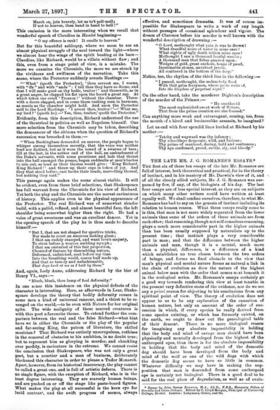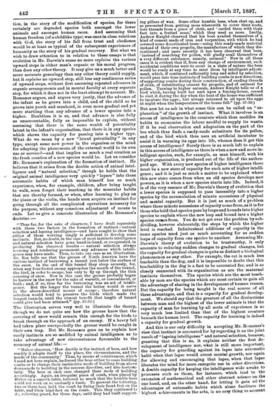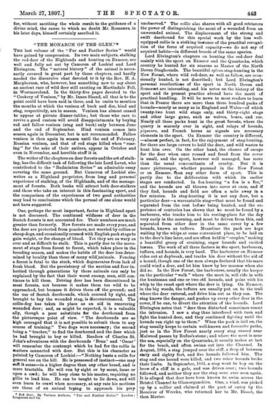THE LATE MR. J. G. ROMANES'S ESSAYS.* THE first six
of these ten essays of the late Mr. Romanes are full of interest, both theoretical and practical, for in the theory of instinct, and in his mastery of Mr. Darwin's view of it, and of all the closely allied subjects, Mr. J. G. Romance was sur- passed by few, if any, of the biologists of his day. The last four essays are of less special interest, as they are on subjects on which many other writers could have written at least equally well. We shall confine ourselves, therefore, to what Mr. Romanes has had to say on the genesis of instinct including its relation to human reason. What these essays really come to is this, that man is not more widely separated from the lower animals than some of the orders of these animals are from each other; that reasoning, though not self-conscious reasoning, plays a much more considerable part in the higher animals than has been usually supposed by naturalists up to the present time ; that instinct plays a very considerable part in man ; and that the difference between the higher animals and man, though it is a mental, much more than a physical, difference, is a difference of a kind which establishes no true chasm between the two orders of beings, and forms no final obstacle to the view that man's physical and mental nature forms as natural a link in the chain of evolution as does the nature of the highest animal below man with the order that comes mat beneath it in the zoological series. Mr. Romance's essays certainly go a good way towards rendering this view at least tenable in the present very defective state of the evidence, nor do we see any a priori reason for objecting to his conclusions from any spiritual point of view. The theory of evolution does not appear to us to be any explanation of the causation of human nature, but only an account of the order of suc- cession in which, if every species be really derived from some species existing, or which has formerly existed, on the earth, we ought to draw out the genealogical table of their descent. There is no more biological reason for imagining any absolute impossibility in holding that the body and mind of savage man should have been physically and mentally developed from the highest of the anthropoid apes, than there is for the absolute impossibility in holding that the body and mind of the domestic dog should have been developed from the body and mind of the wolf or one of the wild dogs with which the domestic dog seems to have so little in common. Whatever difficulty we may have in making the sup- position that man is descended from some anthropoid ape is certainly not biological. There is a good deal to be said for the real place of degradation, as well as of evolu- • Essays by John George Romano., M.A.. LL.D., ALB., Honorary Fellow of Gonvillo and Coins Colleges. Edited by 0. Lloyd Morgan, Primzipal of University Oollege, Bristol. London Longman., Green, and 0o.
tion, in the story of the modification of species, for there certainly are degraded species both amongst the lower animals and amongst human races. And assuming that human freedom (of a childlike type) was once in close relations with God, the story of his fall from trust and obedience would be at least as typical of the subsequent experiences of humanity as the story of his gradual recovery. But what we wish to draw attention to in relation to these essays is that evolution in Mr. Darwin's sense no more explains the various upward steps in either man's organic or his moral progress, than does any other theory. It may give us a much better and more accurate genealogy than any other theory could supply, but it explains no upward step, still less any continuous series of upward steps, without first assuming repeated advances in organic arrangements and in mental faculty at every separate step, for which it does not in the least attempt to account. Mr.
Romanea argues, and argues very justly, that the advance of the infant as he grows into a child, and of the child as he grows into youth and manhood, is even more gradual and yet more startling than any advance of a lower species into a higher. Doubtless it is so, and that advance is also fully as unaccountable, fully as impossible to explain, without assuming that there is the same wealth of potentiality latent in the infant's organisation, that there is in any species which shows the capacity for passing into a higher type. What do we mean by a new "latent potentiality" in any type, except some new power in the organism or the mind for adapting the phenomena of the external world to its own use or service ?—and that implies as much a real creation as the fresh creation of a new species would be. Let us consider Mr. Romanes's explanation of the formation of instinct. He believes that it arises from the double action of animal intel- ligence and "natural selection," though he holds that the original animal intelligence very quickly " lapses " into those automatic habits of which man himself has so much experience, when, for example, children, after being taught to walk, soon forget their teaching in the muscular habits that are thereby formed, or when, after learning to play on the piano or the violin, the hands soon acquire an instinct for going through all the complicated operations necessary for the purpose, without any conscious adjustment of means to ends. Let us give a concrete illustration of Mr. Romanes's -doctrine :—
"Thus far, for the sake of clearness, I have dealt separately with these two factors in the formation of instinct—natural selection and lapsing intelligence—and have sought to show that -either of them working singly is sufficient to develop some instincts. But, no doubt, in the case of most instincts intelligence and natural selection have gone hand-in-band, or co-operated, in producing the observed results — natural selection always securing and rendering permanent any advances which intelli- gence may have made. Thus, to take one case as an illustration. Dr. Rae tells me that the grouse of North America have the curious instinct of burrowing a tunnel just below the surface of the snow. In the end of this tunnel they sleep securely, for, when any four-footed enemy approaches the mouth of the tunnel, the bird, in order to escape, has only to fly up through the thin .covering of snow. Now in this case the grouse probably began to burrow in the snow for the sake of warmth, or concealment, or both ; and, if so, thus far the burrowing was an act of intelli- gence. But the longer the tunnel the better would it serve in the above-described means of escape ; therefore natural selection would tend to preserve the birds which made the longest tunnels, until the utmost benefit that length of tunnel could give had been attained." (pp. 35-36.)
The illustration serves very well to illustrate the theory, though we do not quite see how the grouse knew that the covering of snow would remain thin enough for the birds to .break through on the approach of an enemy. If a heavy fall had taken place unexpectedly the grouse would be caught in
their own trap. But Mr. Romaaes goes on to explain how easily instincts are so modified by animal intelligence as to take advantage of new circumstances favourable to the economy of animal life :—
"Huber observes, 'How ductile is the instinct of bees, and how readily it adapts itself to the place, the circumstances, and the needs of the community.' Thus, by means of contrivances, which I need not here explain, he forced the bees either to cease building combs or to change their instinctive mode of building from above downwards to building in the reverse direction, and also horizon- tally. The bees in each case changed their mode ef building accordingly. Again, an irregular piece of comb, when plaeed by Huber on a smooth table, tottered so much that the humble bees could not work on so unsteady a basis. To prevent the tottering, two or three bees held the comb by fixing their front feet on the table, and their hind feet on the comb. This they continued to d 1, relieving guard, for three days, until they had built support- ing pillars of wax. Some other bumble bees, when shut up, and so prevented from getting moss wherewith to cover their nests, tore threads from a piece of cloth, and 'carded them with their feet into a fretted mass,' which they used as moss. Lastly, Andrew Knight observed that his bees availed themselves of a kind of cement made of iron and turpentine, with which he had covered some decorticated trees—using this ready-made material instead of their own propolis, the manufacture of which they dis- continued; and more recently it has been observed that bees, instead of searching for pollen, will gladly avail themselves of a very different substance, namely, oatmeal.' Now in all these cases it is evident that if, from any change of environment, such accidental conditions were to occur in a state of nature the bees would be ready at any time to meet them by intelligent adjust- ment, which, if continued sufficiently long and aided by selection, would pass into true instincts of building combs in new directions, of supporting combs during their construction, of carding threads of cloth, of substituting cement for propolis, and of oatmeal for pollen. Turning to higher animals, Andrew Knight tells us of a bird which, having built her nest upon a forcing-house, ceased to visit it during the day when the heat of the house was sufficient to incubate the eggs ; but always returned to sit upon the eggs at night when the temperature of the house fell." (pp. 37-39.) But now let us ask in what sense this can be called an "ex- planation" of the growth of instinct. What it involves is an
access of intelligence in the creature which thus modifies its habits to economise the labour needful to supply its wants. If it be real observation and adaptation on the part of the bee which thus finds a ready-made substitute for its pollen, and of the bird which thus uses an artificial incubator to assist it in warming its eggs into life, whence does it get this access of intelligence? Surely there is as much left to explain in this access of intelligence as there is when a new and more in- telligent species, such, for example, as man himself, with his higher organisation, is produced out of the life of the anthro- poid ape. With every new species of higher intelligence there must be a new store of capacity for such acts of higher intelli- gence; and it is just as much a matter to be explained where this new store comes from when an old species develops new powers, as it is when a new species starts into life. Indeed, it is of the very essence of Mr. Darwin's theory of evolution that a lower species is supposed to pass insensibly into a higher species by the accumulation of minute accessions of physical and mental capacity. But it is just as much of a problem where these minute accessions of capacity come from,as it is for those who bold that species pass by leaps and bounds into higher species to explain where the new leap and bound into a higher species comes from. You do not get over the problem by sub- dividing, however elaborately, the steps by which the higher level is reached. Infinitesimal additions of capacity in the same species need just as much accounting for as sudden leaps of capacity from one species to another. Assuming Mr.
Darwin's theory of evolution to be trustworthy, it only amounts to reducing sudden changes to gradual changes, but the capacity for gradual changes is quite as distinct a biological phenomenon as any other. For example, the cat is much less teachable than the dog, and it is impossible to doubt that this teachability in the dog is a fact to be accounted for, and is as closely connected with its organisation as are the maternal instincts themselves. The species which are the most teach- able by man are the species which are most certain to gain all the advantage of sharing in the development of human reason. Bat the capacity for being taught is the real source of all these advantages, and that is a capacity for gradual develop- ment. We should say that the greatest of all the distinctions between man and the highest of the lower animals is that the capacity of man for learning by all sorts of experience is so very much less limited than that of the highest creature beneath the human level. The capacity for learning is indeed a capacity for gradual growth.
And this is our only difficulty in accepting Mr. Romanes's view that instinct is accounted for by regarding it as the joint result of "lapsing intelligence" and natural selection, because, granting that this is so, it explains neither the first de-
velopment a intelligence nor, what is still more important, the capacity for guarding against its lapse into automatic habit when that lapse would arrest mental growth, nor again for allowing and encouraging that lapse, when that lapse liberates the mind for more energetic use in other directions. A double canacity for keeping the intelligence wide awake to
processes such as those, for instance, which lead to the extension of mathematical and other abstract science on the
one hand, and, on the other hand, for letting it gain all the advantages of automatic habits which alone facilitate the
highest achievements in the arts, is no easy thing to account for, without ascribing the whole result to the guidance of a divine mind, the cause to which no doubt Mr. Romanes, in his later days, himself certainly ascribed it.








































 Previous page
Previous page